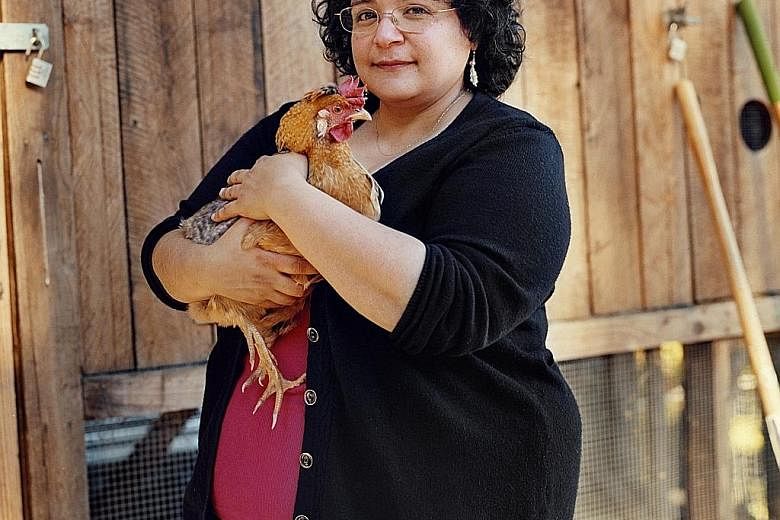LOS ANGELES • Half a dozen. That is how many times composer Gabriela Lena Frank reckons she has visited the grocery store since the coronavirus hit.
She and her husband have otherwise been able to fend for themselves: Their 6ha farm in Mendocino County, California, laid out in Inca-style terraces on a redwood-rich mountain slope, is home to chickens, bees, vegetable patches and dozens of fruit trees.
In a normal year, the farm would also have been bustling with young composers. Since 2017, it has been the home of the Gabriela Lena Frank Creative Academy of Music, an innovative training institution that aims to foster diverse compositional voices.
The core programme is a yearlong apprenticeship spread over multiple short visits, but the academy also nurtures performers and facilitates commissions for its graduates.
The virus forced its activities online, but even without it, the smoky haze from recent wildfires in the region would have made in-person work difficult. The classical music world has seen many climate change initiatives, but few artists have examined the environmental impact of their own practices.
Frank, 48, said she had long been concerned about the music industry's business as usual.
"I built a substantial career on flying," she said. "Even before the pandemic, I thought, 'We have to do some things remotely.'"
She said the increasing ferocity of the wildfires in the West had made her realise the danger of climate change "is here and present and it needs to be grasped".
Diversity and sustainability have been preoccupations for Frank, who was honoured this month with a US$250,000 (S$340,000) Heinz Award, given in a variety of arts and policy disciplines.
Her work celebrates the roots of a family tree that includes her Peruvian mother, a father descended from Lithuanian Jews and a Chinese great-grandfather who sold supplies to Andean miners.
In her music, it is the Peruvian heritage that comes through most clearly, with folk melodies woven into high-spirited pieces full of vibrant colours, slicing rhythms and volatile textures that contract, swell and warp.
She often subverts aural expectations. A string quartet might briefly conjure the sound of pan flutes through clever use of harmonics. In Ritmos Anchinos, written for the Silk Road Ensemble, a Chinese pipa takes on the guise of a charango, a Peruvian mandolin.
Her Sonata Andina for piano is muscular, playful and cheerfully combative. The piano was her chosen instrument - even before she could hear. Her near-profound hearing loss was detected only when she was four. Until then, she had been a happy but quiet child.
She studied composition at Rice University and earned her doctorate at the University of Michigan; commissions around the country followed. But while her career blossomed, she felt her outsider status keenly: a woman of Latino descent with a disability.
And she saw how difficult it was for others to pry open the gates. In founding her academy, she set out not only to nurture new voices but also to encourage alternative musical careers, grounded in activism and service.
In Boonville, where her farm is, she teaches evening classes and volunteers at the local middle school, which serves many children of undocumented agricultural workers.
Frank opens the door to applicants who might not gain entry to standard conservatories. In 2017, Anjna Swaminathan was a violinist deeply conversant in Carnatic music. But, she said in a recent telephone interview, she assumed composition was closed to her because she came out of an oral tradition.
Frank encouraged her to apply. The mentorship, Swaminathan said, taught her how to read and write music, but also how "to create a dignity and ownership around my own voice while navigating new territory".
"She's got this nurturing charisma about her," Swaminathan said of Frank. "All the good things about motherhood and femininity and familiarity are brought into this scary space. Her home is in the middle of a mountain. There's dogs everywhere, and chickens. It shows you that music making is an earthly thing, so why not connect to the earth while we make it?"
NYTIMES

